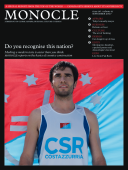
Issue 6
Do you recognise this nation? Making a modern state is easier than you think. Monocle reports on the basics of country construction.
In This Issue
Oops! No content was found.
Looks like we no longer have content for the page you're on. Perhaps try a search?
Return Home

